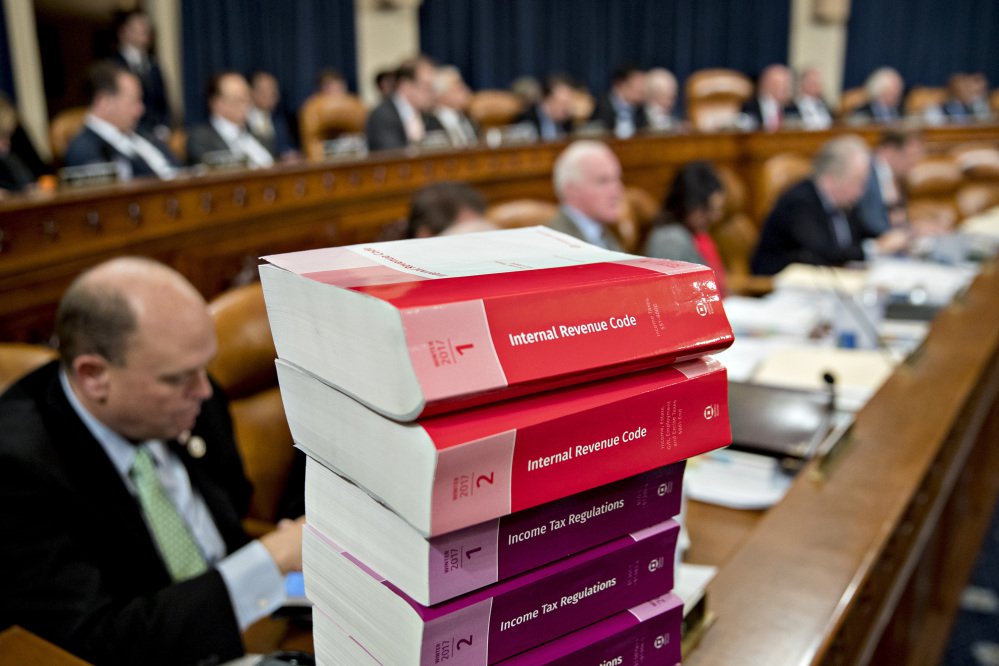It is a strange time to be considering a major tax cut.
The economy is healthy and in no need of fiscal stimulus. The national debt is 77 percent of gross domestic product, the highest since the aftermath of World War II, and growing. Yet congressional Republicans hope to pass a $1.7 trillion tax overhaul by Christmas, while making no attempt to pay for it. Although there is a need for responsible, deficit-neutral tax reform, the current plan is reckless policy that will hurt most Americans and most Mainers.
The fiscal outlook is atrocious. Even without a tax cut, according to Congressional Budget Office projections, debt will reach 91.2 percent of GDP by 2027, requiring interest payments equal to 2.9 percent of GDP. Both figures are dangerously high. This is why in 10 years, taxes will very likely be higher than today, even if the Republican plan fails.
To make things worse, the CBO projects that the Republican plan would further boost the debt to 97.1 percent of GDP by 2027. The plan would thus require even larger tax increases down the road. And because it raises the debt so much, the plan would also have minimal impact on economic growth.
So, who loses from lower taxes today in exchange for higher taxes down the road?
For one, younger Americans. Older taxpayers, who may be retired when the bill comes due, will benefit from immediate tax cuts. But this comes at the expense of young Americans who currently pay little or no tax. They will not benefit from a tax cut in the short term, but they will pay for it in a decade when they are fully integrated into the workforce.
Young Mainers will be particularly hard hit. Because Maine is the oldest state in the country, with an average age of 44.1 years, young Mainers will already be asked to pay for a disproportionate share of the state’s finances. The Republican plan would make them do the same for the federal government’s expenses.
Second, anyone who relies on government services may lose. Some self-described deficit hawks support tax cuts because they hope it eventually creates an environment that allows for large cuts to government spending, especially entitlement programs such as Social Security and Medicare. But 25 percent of Mainers receive Social Security benefits and 23 percent receive health insurance through Medicare, the highest fraction of any state. So Maine’s most vulnerable populations would be especially hard hit by future cuts to these programs.
A tax cut is especially reckless given the current healthy state of the economy. Smart policy tries to stabilize the government’s budget deficit to match the ups and downs of the business cycle. Large budget deficits are acceptable during recessions, both because fiscal stimulus might be needed to respond to the recession and because tax collections necessarily fall when times get tough. But these should be offset with lower budget deficits, or even surpluses, when the economy is doing well.
A tax cut now gets this backward. The risk is that when the time comes to raise taxes, the economy will be in recession. Countries such as Ireland and Spain had to raise taxes and cut spending during the Great Recession. It ended with unemployment rates of 15 percent and 26 percent. The current tax plan risks putting the next generation in a similarly precarious situation.
The other big problem with the tax plan is that it would exacerbate rising economic inequality. The Institute for Taxation and Economic Policy estimates that for the wealthiest 1 percent of taxpayers, the tax cut would equal 2.4 percent of their income in 2018. The poorer half of taxpayers, however, would see a cut of between 0.9 percent to 1.4 percent of their income. In Maine, a relatively poor state and one with a high state income tax (which would no longer be deductible under the plan), the average taxpayer would receive a smaller tax cut than the national average, the institute estimates.
There are some strong parts of the House tax plan. I support the concept of eliminating most deductions. Reducing corporate tax rates also makes sense, but only if personal income taxes, capital gains taxes and others are adjusted to ensure the plan does not make inequality worse.
A good tax plan will increase neither debt nor inequality, and will provide a boost to growth. The Republican plan fails on all three points. Once a tax bill satisfies these, we should support it. But until then, our congressional representatives, like Sen. Susan Collins, must reject this tax overhaul.
Paul Shea is an associate professor of economics at Bates College in Lewiston.
Copy the Story LinkSend questions/comments to the editors.



Success. Please wait for the page to reload. If the page does not reload within 5 seconds, please refresh the page.
Enter your email and password to access comments.
Hi, to comment on stories you must . This profile is in addition to your subscription and website login.
Already have a commenting profile? .
Invalid username/password.
Please check your email to confirm and complete your registration.
Only subscribers are eligible to post comments. Please subscribe or login first for digital access. Here’s why.
Use the form below to reset your password. When you've submitted your account email, we will send an email with a reset code.